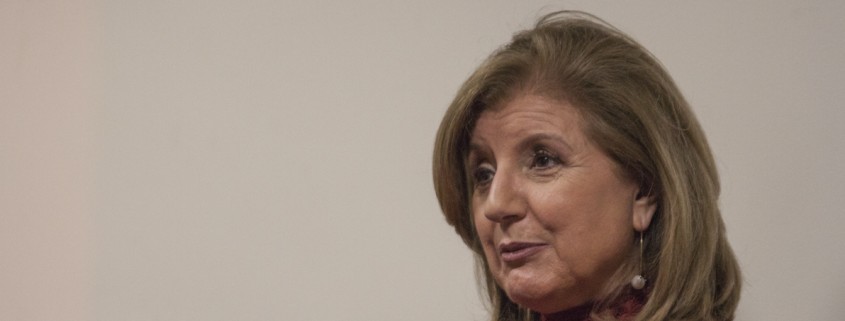Arianna Huffington wants students to get more sleep
Arianna Huffington, president and editor-in-chief of the Huffington Post spoke at the Ronald Tutor Campus Center ballroom last night on her most recent of 15 books, The Sleep Revolution, as part of a Visions and Voices signature event celebrating the 10th anniversary of the program. Her new book uses her data and life experiences to discuss the cultural dismissal of sleep and offers tools needed to sleep properly using her own life experiences and data.
“The main takeaway [of the book] is that we have been living our lives under the delusion that we sacrifice sleep in order to be productive and achieve and improve what we are doing,” Huffington said. “Modern science — including a lot of the science here at USC — proves the exact opposite.”
Huffington believes that the culture is beginning to change, though, and that in a few years conference rooms will be replaced by napping rooms. As of now, she said, high-level executives and politicians are incorrectly stating that lack of sleep is the mark of success.
“People have been known to brag about how much sleep they get and see it as a ‘macho’ symbol and not recognizing that they are — in fact — sacrificing their health, their cognitive abilities, decision making and their happiness,” Huffington said.
Huffington said that her research relates the development of Alzheimer’s to lack of sleep. Toxins that do not escape the body during sleep are stored behind the brain and contribute to the beginnings of Alzheimer’s disease.
“You can either entertain the guests or clean up the house. You can’t do both at the same time,” Huffington said. “There is a clear connection between the epidemic of sleep deprivation and the epidemic of Alzheimer’s.”
During her speech, to the amusement of the audience, Huffington compared lack of sleep and the onset of Alzheimer’s disease to the Republican presidential frontrunner.
“Before Alzheimer’s, you get memory loss, you get difficulty consolidating information, you have difficulty processing information — you basically get Donald Trump,” Huffington said.
According to her own experiences, increasing her sleep from four to seven or eight hours dramatically altered her productivity. Huffington said that there are a few simple steps that students can do to get the highest quality sleep.
“It’s worth taking these few steps at the beginning — turning off our devices before we go to sleep, not charging our phones by our bed, disconnecting so that we can reconnect with ourselves and be fully charged,” she said.
Huffington addressed the dilemma many college students face between staying up all night to study or getting a full night’s sleep.
“All-nighters are the worst thing you can do,” Huffington said. “If you pull an all-nighter you go to your exam with the equivalent of 0.1 [percent] alcohol in your body. So would you ever take five shots before you run into an exam?”
When Huffington collapsed from sleep deprivation and exhaustion nine years ago, she decided to change her life and the lives of others who suffer from lack of sleep. Her number one New York Times bestseller Thrive described how she recovered from the stress she had put on her body and was the impetus for her next and most recent book, The Sleep Revolution.
Huffington has marketed her college tour with the hashtag “#sleeprevolution,” and encouraged attendees to use social media to record their own sleep routine. On this platform she has attempted to raise awareness of drowsy driving, which she said has caused 1.2 million crashes and sleep-associated mental illnesses.
“Lack of sleep can be a matter of life and death, so we’ve launched a campaign against drowsy driving,” Huffington said. “Because while drunk driving numbers are going down, in fact in half, since the designated driver campaign was launched drowsy driving numbers are going up.”
After Huffington summarized her findings in her book and fielded questions from students on how they could maximize their productivity through sleep, a sleep fair was opened, which hosted companies that offered products to increase and improve sleep. Kind, Sleep Number, Muse and Sonni advertised their sleep related products in the rear of the ballroom.
Huffington left students by emphasizing that in order to have the best nights sleep, there should be a fine line between being awake and being asleep.
“You have to create this clear demarcation line between your day life and your sleep,” Huffington said. “Life is really a dance — between making it happen and letting it happen. Live life as though everything is rigged in your favor.”

